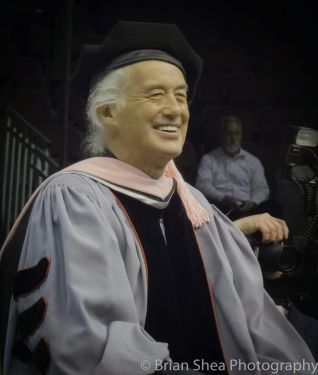What, pray tell, shall I say ??
Maybe the way she hums at the end is indicative of the moaning in the real Danses Macabre? But then, the theme of her lyrics dovetails nicely with the moral of this ancient genre ... universality. In this piece, she seems to state that she is perfectly happy alone. To be kind is to be better than smart, and you can almost imagine her waltzing by herself in a room. Here is the similarity ... in death, indeed, you will from everyone part. (Will you be happy then? Content by the life you lead and all your earthy contrivances?) If you cannot accept even yourself as a partner, how can someone else, no matter how smart you are? If your whole life is a frantic run from (and to) death, how can you find the civilized and modest pace of the Waltz?
It remains triumphant, as death most assuredly will be. and thus, to surrender to life may be the key to connecting with all humanity before, like skeletons, we are reduced to the same likeness.
It's easy, upon listening, to imagine Fiona alone at the piano starting a simple waltz, but there is something forlorn about the time she is playing in. When the other instruments join, it's almost going on in her imagination.
Anyway, I just posted this because it truly is the Danse Macabre and it is never mentioned. But there is a 'spooky' tone to many of the tunes on the Extraordinary Machine CD. It's kind of The Monster Mash meets Jazz. Similar on that album is Better Version of Me, but with a funky up-beat.
I like Fiona for her emphatic use of the lower piano registers. It makes her more real. Her lyrics are simplistic, yet that is the real quality missing in all of today's over-stylized music, and this makes her genuine. She provides a personal sound by having her somewhat jaded if not downright angry, hard tone. This is the area that Fiona explores and in so doing, lends her voice to shaping sensibility. She has resolved the tension between feminism and existentialism by sounding beautiful and resigned and pissed off all at the same time. (which can be self-deprecating, too).
Jon Brion and Matt Chamberlain are at the cutting edge of evocation via tone, I feel. They have to interpret her intuition in the lyrics and voice to make the song have sound. Like most singers, she is as good as her studio musicians.
But in this tune, Waltz (Better Than Fine) there is something about it I cannot articulate. Something resigned to, like death, maybe loss, to which she has reconciled herself and from which she shares her message pleasingly.
It's just life, make it pleasant whether you sing or dance alone or just go out and sit on the lawn. Even if you are only 'waiting for Godot', even just by yourself ... certainly you have lovely bones and they can be made to Waltz.
It's music - "if it sounds good, it is good" ... George Hofgren

